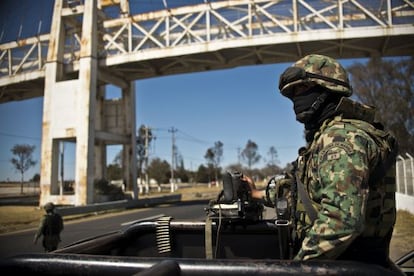Peña Nieto administration forced to face full extent of "disappearances"
Rights group claims police and military cooperated in abducting Mexicans

In October 2008, armed men broke into the home of the Vega family in Tamaulipas, the capital of Tamaulipas state in northern Mexico. A woman, along with her children, hid in the bathroom and called the police emergency 066 number. "If they are already inside, there is nothing we can do for you," she was told. It was the last time that the woman saw her father and her husband.
In December 2011, local police in Zacatecas illegally stopped eight men who were returning home from a hunting trip. Two were able to escape. Hours later, a surveillance camera at a gasoline station showed the police turning over the hunters to other men. Seven officers were charged with cooperating with organized crime. While their trial has not begun, the whereabouts of the six hunters remain a mystery.
The number of people who have disappeared in Mexico during the past six years has cast a dark cloud over the past administration of President Felipe Calderón. Rights groups directly blame Calderón, who left office in December and is now a fellow at Harvard, with ignoring the problem.
More than 35,000 people have signed a petition on the change.org website calling on Harvard to revoke Calderón's fellowship. "Any moral or ethical integrity that Harvard has ever had has been submerged in Calderon's blood-soaked fellowship," the petition states.
A database has surfaced with the names of 27,523 missing people
On February 20, Human Rights Watch (HRW) issued a scathing 176-page report documenting nearly 250 disappearances that took place during the Calderón administration from 2006-2012.
"During the years the Calderón administration ignored this mounting 'disappearance' problem, the country failed to take serious steps to address it. The result was the most severe crisis of enforced disappearances in Latin America in decades," states the report.
HRW said that in 149 cases there is "compelling evidence of enforced disappearances involving the participation of state agents." The report states that navy officers were involved in 20 cases, the federal police in 13 instances of abduction, and local authorities in 95.
In the navy cases, HRW said: "The common modus operandi in these cases suggests that these crimes may have been planned and coordinated [by], or at the very least could not have taken place without the knowledge of, high-ranking navy officials."
It is the most severe crisis in decades of disappearances in Latin America"
José Miguel Vivanco, HRW executive director for the Americas, said that the cases documented in the report are just some "of the thousands" of disappearances that took place during the past six years.
Soon after he came to office, Calderón drafted in the army to help local law enforcement authorities to battle with the drug cartels. More than 65,000 drug-related killings occurred during the presidential term. Rights groups have long charged that the military has committed abuses.
Lía Limón, undersecretary for legal and human rights issues for Mexico's National Defense Secretariat, said Wednesday that there existed a database with 27,523 names of people who disappeared between 2006 and 2012 and who have not been found. In comparison, during Argentina's Dirty War from 1976-83, some 30,000 people went missing.
Nuevo León has been one of the states hardest hit by disappearances in recent years. According to official estimates, some 600 people from the northern state disappeared during Calderón's mandate, while local human rights activists report more than 1,000 cases, according to the HRW report.
Mexico's Attorney General Jesús Murillo Karam, who took up his post with the arrival of President Enrique Peña Nieto's new administration, pledged to try to uncover their whereabouts. "I am not going to promise that I will find them either alive or dead, but I will promise to do everything possible."
The Peña Nieto government also announced the creation of a national commission to search for the missing with the participation of all agencies. "The government of Peña Nieto was probably tempted not to open an investigation because that is a tradition here in Mexico, a country with impunity. But there are several factors that could change all of this, including the organization of a strong victims' movement, international attention, and the changing of public opinion against impunity," said Sergio Aguayo, professor at the international studies center at the prestigious El Colegio de México.
In November 2011, a petition with 20,000 signatures was presented at the International Court at The Hague denouncing the Calderón government, as well as Mexico's drug cartels, for crimes against humanity.
Tu suscripción se está usando en otro dispositivo
¿Quieres añadir otro usuario a tu suscripción?
Si continúas leyendo en este dispositivo, no se podrá leer en el otro.
FlechaTu suscripción se está usando en otro dispositivo y solo puedes acceder a EL PAÍS desde un dispositivo a la vez.
Si quieres compartir tu cuenta, cambia tu suscripción a la modalidad Premium, así podrás añadir otro usuario. Cada uno accederá con su propia cuenta de email, lo que os permitirá personalizar vuestra experiencia en EL PAÍS.
¿Tienes una suscripción de empresa? Accede aquí para contratar más cuentas.
En el caso de no saber quién está usando tu cuenta, te recomendamos cambiar tu contraseña aquí.
Si decides continuar compartiendo tu cuenta, este mensaje se mostrará en tu dispositivo y en el de la otra persona que está usando tu cuenta de forma indefinida, afectando a tu experiencia de lectura. Puedes consultar aquí los términos y condiciones de la suscripción digital.








































